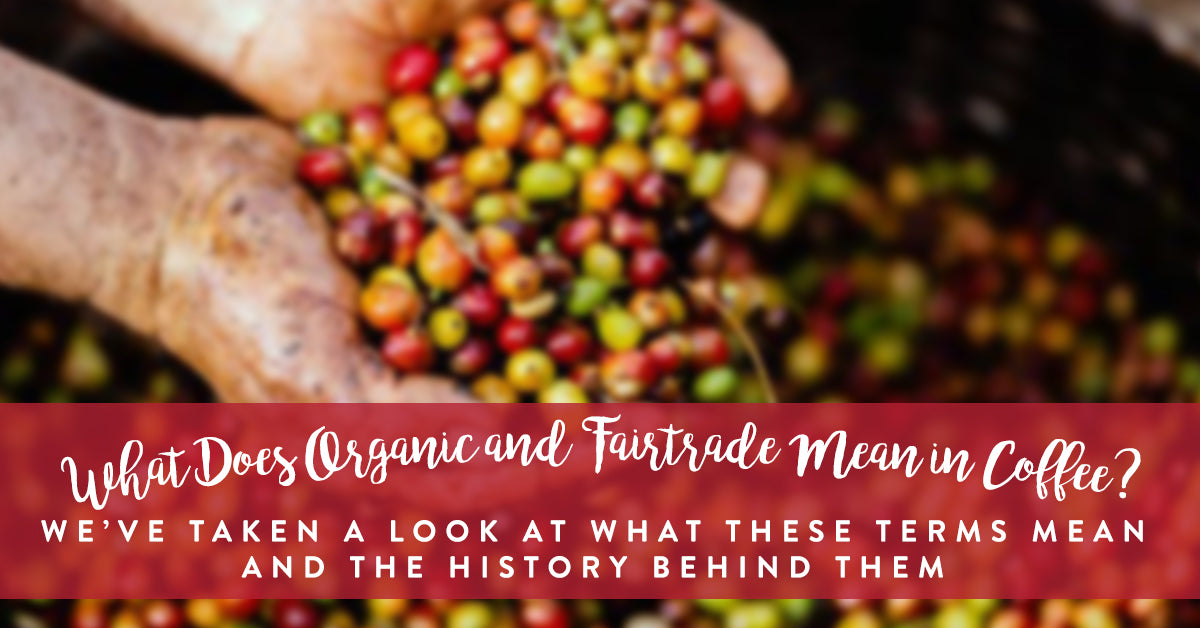
What Does Organic and Fairtrade Mean in Coffee?
Within the coffee industry, terms such as ‘Fairtrade’ and ‘organic’ are very common to see on coffee packaging, but what do they actually mean? We’ve taken an in-depth look at these two terms this month to help us understand what they truly mean.
Firstly let's look at the key differences between the two, Fairtrade is all about the supply chain and making sure farmers across the world are paid fairly for their work. Organic is about production of coffee and what physical things have been used in the process.
Organic
Organic simply means produced without the aid of unnatural chemicals, this includes everything from additives to pesticides. This sounds rather simple when put like this, so why isn't all coffee organic? A big factor to consider is that some coffee farms wouldn't be able to grow coffee crops without certain weed killers. As coffee tends to grow in nutrient rich soil, this of course means weeds are going to like growing here too so at some farms using weed killer or repellent is needed.
Eating or drinking something non-organic might put some people off but if we look at another example of why something may be non-organic, we can start to see why it might not be so bad afterall:
You can grow some of the freshest and healthiest vegetables you’ll ever eat if you were to start an allotment, however, you might want to keep slugs from eating your crops by using some pesticides, at this point, if you buy the wrong pesticides, your crop becomes non-organic. For people who don’t want to harm slugs and bugs, a common remedy is mixing washing up liquid with water which just repels the insects rather than hurting them but again, if you use your average washing up liquid, your crop becomes non-organic.
So now we understand this, it really is a personal preference whether you go organic or not. Some of our favorite coffee just wouldn't exist if we only supplied organic coffee.
Fairtrade
Fairtrade is a global movement, represented by the Fairtrade Foundation. Whilst it’s worldwide, there is a particularly strong Fairtrade presence in the UK. Fairtrade means the farmers that produce your coffee may be paid more than farmers who produce non Fairtrade coffee. Sometimes Fairtrade can cost more in order to pay the farmers more, but Fairtrade is also about making sure the whole supply chain is fair, so it’s not just the end user paying more while the middle men make all the profits.
The Fairtrade Foundation is a charity and was founded in 1992 however the idea of ‘Fairtrade’ dates back to the 1940’s in the USA, where charity Self Help Crafts began buying needlework products from Puerto Rico. In the UK, Oxfam UK began selling crafts made my chinese refugees in the late 1950’s with the aim of paying them more than would receive making these in China.
The first widespread Fairtrade coffee started being sold in the Netherlands in 1973.
In the next few decades, the media of course become more and more accessible all over the world and whilst the majority of news around foreign produce was negative, this fueled the fire for the public to support the idea of Fairtrade.
Fast forward to 2019 and Fairtrade is all over the world, according to www.fairtrade.org.uk there are now 1.66 million farmers and workers who work in a Fairtrade certified organisation across 73 countries. Fairtrade farms must invest at least one quarter of the extra premium they change into the quality of the working environment as well as investing in increasing productivity meaning farmers can make even more money with the appropriate tools and training.
As with organic, if we only supplied Fairtrade coffee, we wouldn't have the range we have now and would be missing many of our favorites. We of course need to remember, for an organisation to become Fairtrade there is a lot of time, effort and money involved and for smaller companies, this may not be a priority for them. A non Fairtrade organisation also doesn't mean they do not pay fairly, many countries have minimum wage which will be met or exceeded. We take on a social responsibility when we as a business supply coffee, or a consumer drinks coffee - we are all part of the chain. When we are dealing with non Fairtrade coffee, we first make sure it follows our social responsibility beliefs.
So in conclusion, both terms are important, but how important is down to each individual. If you are interested in trying our Organic and Fairtrade coffee, we supply a couple of options here:


